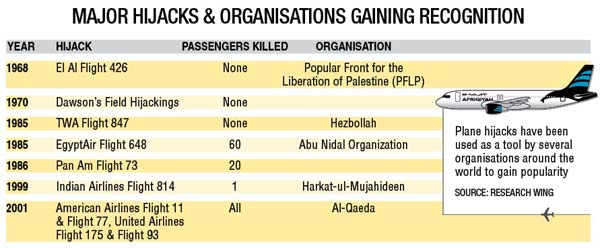
The latest hijack of the Libyan Afriqiyah Airways A320 by pro-Gaddafi activists in Malta ended happily. The two men asked for asylum in Malta. The hijack didn’t seem planned. They had grenades and threatened to blow up the plane but let go of the crisis fast enough. The world went on high alert but the impasse ended fairly quickly, and the world moved on.
Usually, a hijack doesn’t end that easily. Usually, the statement it makes is heard loud and clear across the globe. The downside is that it usually is the last statement the movement ever makes in describing what it stands for. Holding innocent civilians hostage and killing them is not a motto you want to hold on to as a group, or even as an individual, to describe your challenges in understanding your world or trying to fit in.
Hijackings have traditionally been used to birth political movements into the public domain. Their means have been violent, to draw attention to their perceived causes with no thought to the damage wreaked. In the ’70’s when Palestinian militants started hijacking planes, the target was primarily Jews and Americans. The Dawson’s Field hijackings involved El Al Flight 219, the Trans World Airlines (TWA) Flight 741, Swissair Flight 100, and Pan American Flight 93. The El Al hijacking was thwarted by the pilot. Terrorists from the Popular Front for the Liberation of Palestine (PFLP) successfully hijacked the other three jetliners enroute to the US from European airports in September 1970. When 421 passengers and crew on board the three planes were freed in Jordan on September 11, hijackers held on to 56 hostages, most of them Jewish and American men. They blew up the empty planes on September 12.
On June 23, 1985 Sikh separatists blew up Air India Flight 182 when it was flying over the Atlantic Ocean en route to New Delhi from Montreal via London. A bomb was detonated in the cargo bay of the plane. The crash resulted in the deaths of 329 people.

It speaks volumes that several of the movements today remembered by incidents of hijacking, operated—often killing hundreds for years—long before they performed these acts. Islamic extremist group Al-Qaeda, dominant in their area of operations, shot to prominence with the hijacking of September 11, 2001, when they used American Airlines Flight 11 and Flight 77, United Airlines Flight 175 and Flight 93 to launch an attack on the USA. Nineteen militants hijacked four airliners. Two planes were flown into the World Trade Center in New York, a third hit the Pentagon, and the fourth crashed in Pennsylvania.
The same goes for the Taliban, which the world only took notice of on December 24, 1999, when they hijacked Indian Airlines Flight 814, holding 176 passengers and 15 crew members hostage by the militants of Harkat-ul-Mujahideen. The flight from Kathmandu to New Delhi was diverted to Kandahar, Afghanistan. To end the hostage crisis, the Indian government, led by then Prime Minister Atal Bihari Vajpayee, released three militants, who later masterminded the 9/11 Mumbai attacks.
The holding of airlines ransom to political causes has been a favoured ploy by political asylum seekers and ideologues alike. But often the acts that bring these by-any-means groups to notice, are also what brings about the downfall of their movements. The choice of violent means inevitably comes when their cause has lost the justice of purpose.
A long-time Palestinian diplomat once wondered on live television if his people “would have to hijack your planes again” to get the West interested in the Palestinian cause. It was a lament, not a threat, and came from a place of frustration that many political causes, few just, are not noticed until they adopt violent means. “You always wait for things to reach the boiling point and explode, causing you harm, before you intervene” said Nabil Shaath, senior Palestinian official, addressing the Western world.
Sadly, the success of early hijackings made them an increasingly popular weapon of the PLO. In 1976, Zehdi Terzi, the first PLO representative to the United Nations, said, “the first several hijackings aroused the consciousness of the world and awakened world opinion much more–and more effectively–than 20 years of pleading at the United Nations.”
Since 2010 however, hijackings have also become motivated more by personal than political ends. Individuals were prompted by unstable psyches to commit such attacks. None were armed, and in many instances, the hijacker surrendered after negotiations.
Any movement in the last few decades that has decided to take the route of hijacked planes has been viewed as a desperate last measure. Targeting civilians cannot be a respectable statement of moral high ground. If you have a point and you are trying to build a society on the basis of a democracy, then your voice cannot be kept quiet. Even your smallest squeak will be heard.
So, if you really do want to make a point, then do so with peace, not with planes. They will not help your cause fly.